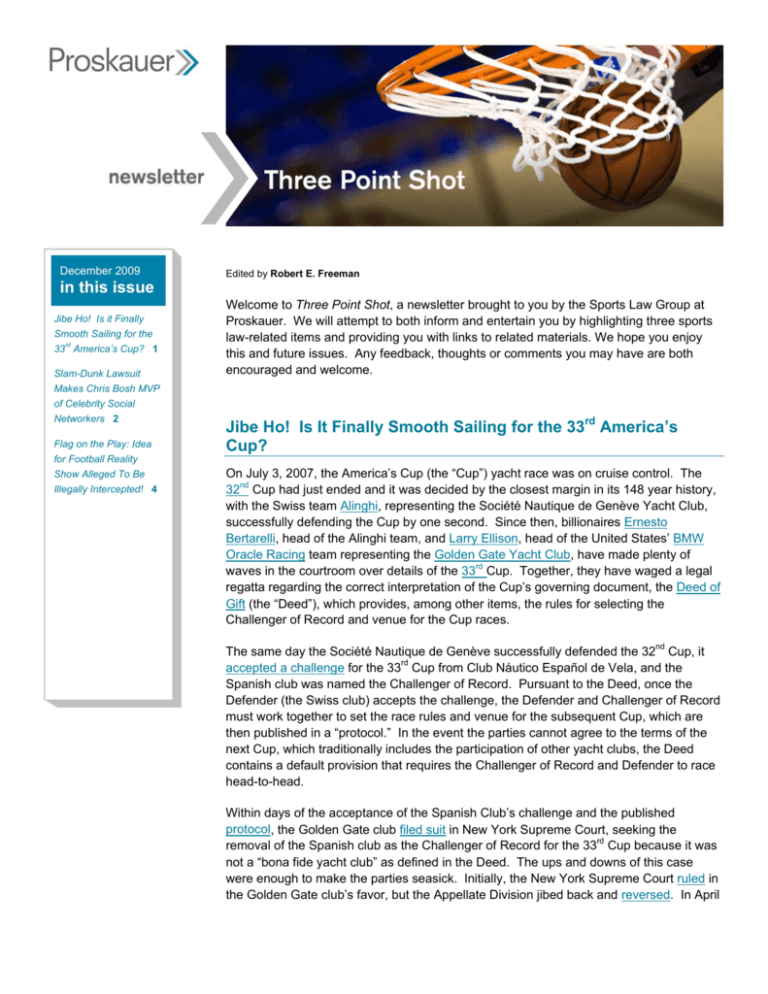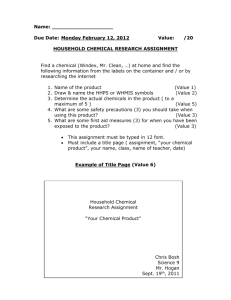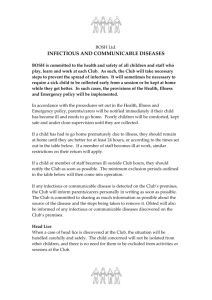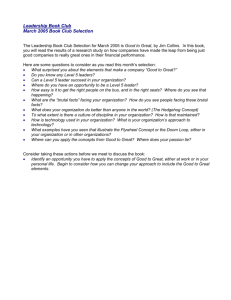
December 2009
Edited by Robert E. Freeman
in this issue
Jibe Ho! Is it Finally
Smooth Sailing for the
rd
33 America’s Cup? 1
Slam-Dunk Lawsuit
Welcome to Three Point Shot, a newsletter brought to you by the Sports Law Group at
Proskauer. We will attempt to both inform and entertain you by highlighting three sports
law-related items and providing you with links to related materials. We hope you enjoy
this and future issues. Any feedback, thoughts or comments you may have are both
encouraged and welcome.
Makes Chris Bosh MVP
of Celebrity Social
Networkers 2
Flag on the Play: Idea
Jibe Ho! Is It Finally Smooth Sailing for the 33rd America’s
Cup?
for Football Reality
Show Alleged To Be
Illegally Intercepted! 4
On July 3, 2007, the America’s Cup (the “Cup”) yacht race was on cruise control. The
32nd Cup had just ended and it was decided by the closest margin in its 148 year history,
with the Swiss team Alinghi, representing the Société Nautique de Genève Yacht Club,
successfully defending the Cup by one second. Since then, billionaires Ernesto
Bertarelli, head of the Alinghi team, and Larry Ellison, head of the United States’ BMW
Oracle Racing team representing the Golden Gate Yacht Club, have made plenty of
waves in the courtroom over details of the 33rd Cup. Together, they have waged a legal
regatta regarding the correct interpretation of the Cup’s governing document, the Deed of
Gift (the “Deed”), which provides, among other items, the rules for selecting the
Challenger of Record and venue for the Cup races.
The same day the Société Nautique de Genève successfully defended the 32nd Cup, it
accepted a challenge for the 33rd Cup from Club Náutico Español de Vela, and the
Spanish club was named the Challenger of Record. Pursuant to the Deed, once the
Defender (the Swiss club) accepts the challenge, the Defender and Challenger of Record
must work together to set the race rules and venue for the subsequent Cup, which are
then published in a “protocol.” In the event the parties cannot agree to the terms of the
next Cup, which traditionally includes the participation of other yacht clubs, the Deed
contains a default provision that requires the Challenger of Record and Defender to race
head-to-head.
Within days of the acceptance of the Spanish Club’s challenge and the published
protocol, the Golden Gate club filed suit in New York Supreme Court, seeking the
removal of the Spanish club as the Challenger of Record for the 33rd Cup because it was
not a “bona fide yacht club” as defined in the Deed. The ups and downs of this case
were enough to make the parties seasick. Initially, the New York Supreme Court ruled in
the Golden Gate club’s favor, but the Appellate Division jibed back and reversed. In April
2009, the Court of Appeals calmed the waters and agreed with the Supreme Court,
holding that the Spanish club was not a “bona fide yacht club,” because, as required by
the Deed, it had failed to host an annual regatta prior to issuing its challenge. Instead,
the Golden Gate club was instated as the Challenger of Record for the 33rd Cup pursuant
to its July 2007 Notice of Challenge.
The legal to-and-fro, however, did not end there. As part of the judgment issued
pursuant to its April decision, the Court of Appeals ordered that the 33rd Cup be held in
February 2010 in “Valencia, Spain or any other location selected by [the Swiss club].”
After the Swiss club tried to schedule the 33rd Cup for May 2010, the Golden Gate club
sailed into the New York Supreme Court again and Justice Shirley Kornreich enforced
the terms of the April 2009 order to hold the Cup in February 2010.
To make matters murkier, the Deed provides that no race shall be held between
November 1 and May 1 in the northern hemisphere or between May 1 and November 1 in
the southern hemisphere, without mutual consent of the parties. On August 5th, the
Swiss club chose Ras al-Khaimah in the United Arab Emirates, a northern hemisphere
location, as the venue for the 33rd Cup. To no one’s surprise, on October 1st, the Golden
Gate club brought the Ras al-Khaimah venue selection before the New York Supreme
Court and argued that pursuant to the April 2009 order and the Deed, the Swiss club is
not permitted to select a northern hemisphere location for a race in February without the
participants’ mutual consent. The Swiss club countered that the April 2009 order makes
no reference to the Deed’s hemisphere restrictions and unambiguously permits it to
select a northern hemisphere location as the venue. At a hearing on October 27th, Judge
Kornreich adhered to the letter of the Deed, agreeing with the Golden Gate club that a
race held in February must either be in the southern hemisphere or in Valencia as the
only exception to that rule because the parties agreed to it by mutual consent.
To add to the tsunami of Cup-related litigation, on October 26th, one day before the venue
hearing, the Golden Gate club filed another suit in New York Supreme Court that sought
the removal of the Swiss club as trustee of the Cup, based on allegations that it had
breached its fiduciary duties and obligations. Among other things, the Golden Gate club
alleged that the selection of Ras al-Khaimah was part of a complex web of side deals
intended to leverage the Cup and to benefit the Swiss club directly. Further, according to
the complaint, such a location exposed the American Golden Gate club to unwarranted
risks due to its proximity to Iran.
Even after the October 27th ruling, the fate and location of the 33rd Cup was still uncertain.
On November 10th, the Swiss club published the Notice of Race scheduling Valencia as
the race location, while continuing its appeal of the ruling. However, on December 15th,
the Appellate Division offered a life raft and unanimously upheld the October 27th ruling
that the 33rd Cup could not be held in Ras al-Khaimah because it was not compliant with
the Deed’s hemisphere requirements. As of this writing, the Swiss club has not appealed
and has stated its desire to race in Valencia in February 2010.
Slam-Dunk Lawsuit Makes Chris Bosh MVP of Celebrity Social
Networkers
When NBA star and avid social networker Chris Bosh – the 25-year-old power forward for
the Toronto Raptors – learned that his eponymous domain name, chrisbosh.com, had
Three Point Shot 2
been snatched by a “cybersquatter,” he instituted a legal full-court press hoping to force a
turnover of his desired web address. Following a default judgment against domain-name
usurper Luis Zavala, a federal district court granted Bosh’s ex parte motion to compel a
transfer not only of his domain name, but also of Zavala’s entire mélange of nearly 800
mostly celebrity-related domain names (Bosh v. Zavala, Case No. 2:08-cv-04851 (C.D.
Cal. 2009)). Lest he become a cybersquatter himself, the three-time NBA All-Star is now
offering to return the domain names to his fellow “cyber-victims” upon written request.
The peculiar tale of how Bosh became keeper of other celebrities’ domain names began
with Zavala’s unauthorized registration of a panoply of web addresses. To earn some
extra cash, Zavala registered addresses for websites that he guessed Internet users
would visit in search of information regarding a particular celebrity or event. These pages
did not contain information on the subject of the domain name, but rather several
“dummy” links labeled with the celebrity’s name or profession that connected to websites
selling goods or services. For instance, on chrisbosh.com, Zavala posted “pay-per-click”
links entitled “Chris Bosh” and “Toronto Raptors.” For each click on a link by a visitor,
Zavala earned a fee. Zavala collected fees from a long list of domain names containing
the names – and in some cases, permutations of names – of NBA stars, famous
actresses, children of celebrities, and high school and college basketball and football
players. According to a blog post by Zavala, registering the names to achieve “[t]raffic
monetization” is “a great source of income for domains that are just parked.”
Unfortunately for Zavala, his “great source” of income is also a flagrant foul under the
federal Anticybersquatting Consumer Protection Act (ACPA), if done with the “bad faith
intent to profit from [someone’s] mark, including a personal name.”
Tech-savvy Bosh, who has almost 78,000 Twitter followers and 17,500 YouTube channel
subscribers, was disappointed when he could not round out his social networking tripledouble with the optimal domain name. Dissatisfied with the second-best domain name –
containing the black spot of a hyphen – chris-bosh.com, Bosh decided to take action
against Zavala. Self-described as “one of the most viral athletes in the world,” Bosh sent
Zavala a demand to stop using the web address, to which Zavala replied, “I am not in the
business of giving domains away.” With the ball back in his court, Bosh sued Zavala
under the ACPA for registering the domain name and California’s right of publicity statute
for the unauthorized use of his famous name, seeking preliminary and permanent
injunctions and monetary damages. To prevail under the ACPA, Bosh needed to plead
and prove that Zavala was acting in bad faith when he registered the domain name. Two
of the nine factors listed as indicative of bad faith under the Act are “the person’s intent to
divert consumers from the mark owner’s online location to a site accessible under the
domain name . . . for commercial gain . . . by creating a likelihood of confusion as to the
source” and “the person’s registration or acquisition of multiple domain names which the
person knows are identical or confusingly similar to marks of others . . . .” Bosh’s
complaint set forth facts to support each of these indicia of bad faith.
Once the clock expired on Zavala’s time to answer the complaint, Bosh completed his
breakaway with a slam dunk, winning a default judgment of $100,000 in damages, plus
attorneys’ fees and costs, and, more importantly, the transfer of chrisbosh.com. Zavala –
sticking to his statement that he does not give domain names away – failed to comply
with the order, prompting Bosh to file an ex parte motion for a turnover of Zavala’s entire
portfolio of web addresses. In granting the motion, the court ordered the registry provider
of the domain names, VeriSign, Inc., to transfer all of Zavala’s domain names to Bosh.
With Verisign’s assist, Bosh netted ownership of the entire cache of domain names.
Three Point Shot 3
Though Bosh’s website still is housed primarily at chris-bosh.com, now visitors to
chrisbosh.com are directed to the primary website where they can purchase “First Ink,” a
documentary featuring Bosh’s comedic films. For the multitude of web addresses Bosh
now owns but is unaffiliated with, not only is Bosh offering to return the hijacked domain
names to celebrities free of charge, he also is offering them his social networking skills
through his web media design and technology consulting firm, Max Deal Technologies.
Celebrities must contact Max Deal if they want use of any domain name transferred to
Bosh. Upon winning the names, Bosh stated, “I am thrilled that I am able to offer the
return of these domain names to a host of other athletes and celebrities whose names
were cybersquatted,” and added, “I’d also love the opportunity to show their owners how
Max Deal can help.”
The comedian in Bosh was likely amused by the irony resulting from the transfer of
names from Zavala to Bosh. Now, if Zavala wants to regain control of luiszavala.com, he
must contact Bosh.
Flag on the Play: Idea for Football Reality Show Alleged To Be
Illegally Intercepted!
When a perfect play takes place on the football field, it is commonplace to reward both
the coach who devised the plan and the players who executed it with the game ball.
Unfortunately, the process for determining who deserves credit for a successful
television show concept is much less straightforward.
Last May, former Dallas Cowboys star Michael Irvin produced and hosted a Spike TV
show called 4th and Long where he oversaw 12 football amateurs as they fought for a
spot on the Cowboys' roster. While Irvin was enjoying mild cable television success,
coming up on his blind side was a lawsuit from three men claiming Irvin stole the initial
show concept from them.
The complaint, filed in Dallas County District Court, alleges the plaintiffs approached Irvin
in 2007 to discuss a show titled "Guts to Glory" that would feature contestants competing
for a spot on a professional football team. Plaintiffs accuse Irvin of fraud, breach of
contract and unjust enrichment. Irvin's defense playbook includes claims that he thought
of the idea after first watching American Idol, that he met with multiple reality show
producers at the time, and that the final show hinged on Irvin's personal relationship with
Cowboys owner Jerry Jones.
Without conclusive evidence, one's odds of proving priority with respect to an idea are no
better than an opening game coin toss. In the Irvin case, the plaintiffs’ position is likely
further weakened by the fact that "elimination style" reality shows are anything but
original, and that initial possession of a reality show concept is a subject often litigated
without much success. In a recent example, this past summer A&E’s show, Steven
Seagal Lawman, found itself subject to similar claims that the show’s producers stole the
concept for the show. However, the plaintiffs here do have some extra points beyond
merely alleging the idea for the show was theirs.
According to the plaintiffs, during their discussions with Irvin, they turned over marketing
tools to Irvin, including a story board, which they allege Irvin used to convince the
Cowboys to participate in the show. Furthermore, the plaintiffs claim they reached a deal
Three Point Shot 4
with Irvin that included a profit-sharing arrangement. The plaintiffs claim that Irvin, with
knowledge of the show concept, carried a misappropriated version of the show into the
end zone without them.
Whether the plaintiffs are just taking free kicks at a sports celebrity and looking for a
score or Irvin is punting on the truth remains to be seen. The one lesson that should be
learned by anyone tackling the development of a reality television show is that, as a
safety, one should always get a signed confidentiality agreement from the kick-off or, at
the very least, hold any potential concept close to the vest until ready to throw to a
trusted receiver.
For more than 45 years, Proskauer has represented sports leagues and sports teams in all aspects of their operations.
For more information about this practice group, contact:
Robert Batterman
212.969.3010 – rbatterman@proskauer.com
Robert E. Freeman
212.969.3170 – rfreeman@proskauer.com
Howard L. Ganz
212.969.3035 – hganz@proskauer.com
Wayne D. Katz
212.969.3071 – wkatz@proskauer.com
Joseph M. Leccese
212.969.3238 – jleccese@proskauer.com
Jon H. Oram
212.969.3401 – joram@proskauer.com
Howard Z. Robbins
212.969.3912 – hrobbins@proskauer.com
Bradley I. Ruskin
212.969.3465 – bruskin@proskauer.com
This publication is a service to our clients and friends. It is designed only to give general information on the
developments actually covered. It is not intended to be a comprehensive summary of recent developments in the law,
treat exhaustively the subjects covered, provide legal advice, or render a legal opinion.
Boca Raton | Boston | Chicago | Hong Kong | London | Los Angeles | New Orleans | New York | Newark | Paris | São Paulo | Washington, D.C.
www.proskauer.com
© 2009 PROSKAUER ROSE LLP. All Rights Reserved. Attorney Advertising.
Three Point Shot 5








